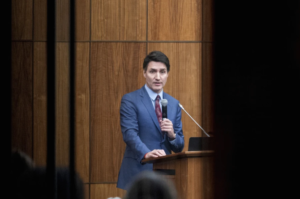
TORONTO (NV) — Canadian Prime Minister Justin Trudeau is set to reshuffle his Cabinet on Friday, according to two senior officials familiar with the situation. The move comes amidst growing calls for his resignation and increasing dissatisfaction within his party.
The officials, who spoke on condition of anonymity due to lack of authorization to discuss the matter publicly, confirmed the impending Cabinet changes.
Rising Discontent and Calls for Resignation
Trudeau’s leadership has come under intense scrutiny following the abrupt resignation of Finance Minister Chrystia Freeland earlier this week. Freeland’s departure, coupled with criticism of Trudeau’s handling of economic issues, has fueled discontent among Liberal lawmakers.
While a growing number of Liberal Members of Parliament have called for Trudeau to step down, Dominic LeBlanc, the newly appointed Finance Minister, stated on Thursday that Trudeau retains the “full support of his Cabinet.”
“The prime minister listened carefully when concerns were expressed to him,” LeBlanc said. “He responded to specific issues and promised to reflect carefully on them.”
External Pressures: U.S. Tariff Threats
In addition to internal challenges, Trudeau’s government faces external pressures, including a looming threat by U.S. President-elect Donald Trump to impose a 25% tariff on Canadian imports. LeBlanc emphasized that the government’s focus must remain on addressing these external threats.
“We shouldn’t be looking inward. We shouldn’t be worrying about ourselves,” LeBlanc said. He also announced plans to meet with Tom Homan, Trump’s incoming “border czar,” after Christmas to discuss border security measures aimed at averting the tariffs.
Political Challenges and Party Dynamics
Trudeau, who has led Canada for nearly a decade, has seen his popularity plummet in recent years due to rising inflation and a soaring cost of living. With no immediate mechanism for his party to force him out, Trudeau’s leadership could end either through his resignation or a no-confidence vote in Parliament, which would likely lead to an election favoring the opposition Conservative Party.
Natural Resources Minister Jonathan Wilkinson urged patience, stating, “We all need to give him a little time to reflect.”
Cabinet Resignations and Parliamentary Dynamics
Freeland’s resignation on Monday was preceded by the housing minister’s departure, intensifying concerns over Trudeau’s leadership. Freeland had been openly critical of Trudeau’s economic policies, particularly in light of the potential U.S. tariffs.
Trudeau’s Liberals, lacking a parliamentary majority, have long relied on the left-leaning New Democratic Party (NDP) for support. However, NDP leader Jagmeet Singh has called for Trudeau’s resignation, signaling a collapse of that alliance. Despite this, Singh has refrained from committing to a no-confidence vote, citing the need to address potential retaliatory measures against U.S. tariffs.
Mark Carney’s Role
Speculation about Mark Carney, the former head of the Bank of Canada and Bank of England, joining the government was dismissed by LeBlanc. While Carney has expressed interest in entering politics, LeBlanc confirmed that he would not be taking on the role of Finance Minister in the short term.
“The prime minister asked me to prepare for the upcoming budget in the spring,” LeBlanc said.
Looking Ahead
Parliament remains in recess for the holidays and will reconvene late next month. Any potential no-confidence vote could be scheduled thereafter, leaving Trudeau’s future leadership in uncertainty. For now, the upcoming Cabinet reshuffle appears to be an attempt to stabilize his government amidst growing challenges.
